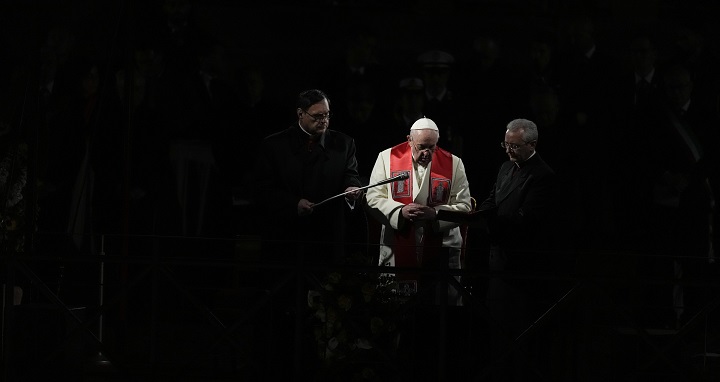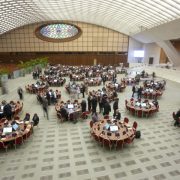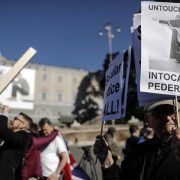
One of the critical contributions of Pope Francis[1] in his years of pontificate has been to avoid, prevent, and nip in the bud any attempt to use religion for political purposes, especially to justify war.
He has done this essentially by choosing not to align the Catholic Church in favor of one or another political cause. He instead decided to speak for the faithful of other religions as well.
It has been true in the Middle East, where Christians were under attack by certain sectors of Muslim-majority terrorists. It is also true in Ukraine, where Ukrainians and Orthodox are theoretically aligned on opposite sides.
The attempt of political leaders to use religion for their ends would, of course, split the world and create enormous tensions for everyone but especially for the West, since Europe and America have given up the idea of religious warfare for centuries. The point is religious for the Pope but has important political implications for everyone.
When the Pope speaks to ordinary Muslims or the Russian Orthodox, he takes fuel away from the enemies of peace and tries to find peaceful solutions to existing conflicts. In purely political terms, the Pope is moving into a space that at the end of World War II was supposed to be that of the United Nations, of finding mediation and dialogue between different parties in mutual respect, regardless of who is right or wrong.
It doesn’t mean a country is not entitled to defend itself in case of aggression, but the Church needs to take no sides to promote peace.
The Pope does it without political goals for himself or the Holy See and without religious aims. He does not want to convert Muslims to Christianity, nor does he want to convert the Orthodox to the Catholic faith.
Objectively, however, in this sense, precisely because he does good for good’s sake, he helps his faith without harming others. He takes the boat to the middle of the sea and does not throw nets or hooks but waits for the fish to jump on board, if they jump. If they don’t jump into the boat, however, this sailing has already achieved its purpose: to try to calm the waters.
With this action, the Pope is marginalizing Islamic extremists in the Middle East in political terms. He is thus helping political and economic integration between Israel and some of its Islamic neighbors. In Ukraine and Russia, he is laying the seeds for a new cultural and political relationship beyond religious purposes.
Indeed, the point is that the Russian invasion of Ukraine alienated the majority of Ukrainians from Russia. This majority, about 60%, was of the Russian Orthodox faith. Ukrainian Russian Orthodox are also important to the Russian Orthodox Church because Kyiv is the cultural cradle of Russian Orthodoxy. Also, many Ukrainian priests go to work in Russia. In other words, the clergy of Russian Orthodoxy is made up of no insignificant part of Ukrainians who have moved to Russia.
Russian President Vladimir Putin’s invasion thus has the practical effect of having torn apart the unity of the Russian Orthodox Church, which precisely included Ukraine as part of Russia. The Russian Orthodox Church is one of Putin’s domestic political consensus pillars, so to have undermined this reality significantly weakens Putin himself within Russia.
Furthermore, today those who were Russian Orthodox in Ukraine are changing affiliation, and hundreds of parishes, in fact, now refer to religious leaders of Ukrainian Orthodox and are no longer Russian.
Broadly speaking, there are, in fact, three faiths in Ukraine: Latin and Greek rite Catholics, Orthodox who answer to the Patriarch of Constantinople and have autocephaly, and then the majority, 60% before the conflict, were Russian Orthodox recognizing the Moscow’s Patriarch.
The latter has moved away from Moscow’s Patriarch and is migrating toward allegiance to the Patriarch of Kyiv. This has implications for the faithful in Ukraine and especially for the Russian Orthodox faithful in Russia. Putin failed to turn the invasion of Ukraine into a holy war against the Nazis also because he couldn’t pit Russian orthodox in Russia against faithful of the same Church in Ukraine.
On the contrary, that the Russian Orthodox of Ukraine has turned away from loyalty to Moscow’s Patriarch shakes the very foundations of the Russian Orthodox Church with its aim of universality and being the Third Rome and undermines one of the bases of Putin’s power and consensus in Russia.
This failure isolates Moscow’s Patriarch from the rest of the Orthodoxy, thus undermining its ambition to lead global orthodoxy. It also lays the foundation for a possible reunification of Russian orthodoxy with Rome.
This was done without declaring war but rather by doggedly and against all opposition, pursuing peace. It is a fundamental political revolution; it demonstrates the strategic use of peace and dialogue to pursue political goals of peace and not conflict. Every country interested in peace should therefore look carefully at this action.
The lessons for China could be many here. It proves that the Pope is a force for peace, independent from pressures from the West and the East. Beijing doesn’t need “friends” that sheepishly follow it in return for a bribe. It needs reliable partners that tell the truth and offer a different perspective.
Moreover, it proves that it’s difficult and tricky now to use religion for political goals. It can easily backfire. Some US politicians tried to do it, but like with the Russian Orthodox, they ended up splitting their Churches.
The political activism of some Catholics in Hong Kong is splitting the Church in the city. It could happen to Christians in China, subject to very intense political indoctrination to “sinicize.” Beijing does it as it fears Christianity can be a conduit of subversion in China. But religion is volatile; it can easily backfire, as religious people are afraid of nothing but losing their faith.
[1] For this article I’m grateful to father Lorenzo Prezzi for his teaching and his articles.





